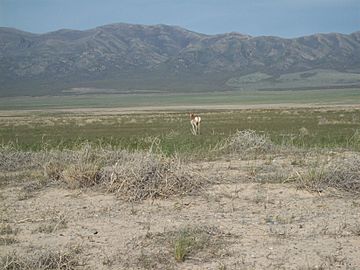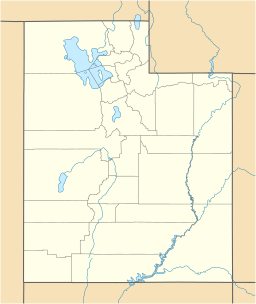Onaqui Mountains facts for kids
Quick facts for kids Onaqui Mountains |
|
|---|---|

Looking southeast toward the Onaqui Mountains, May 2009
|
|
| Highest point | |
| Peak | Stookey Benchmark |
| Elevation | 2,749 m (9,019 ft) |
| Geography | |
| Country | United States |
| State | Utah |
| County | Tooele County |
| Range coordinates | 40°12′35.7977″N 112°33′37.848″W / 40.209943806°N 112.56051333°W |
The Onaqui Mountains are a mountain range located in Tooele County, Utah, in the United States. These mountains are a cool place to explore and are especially famous for their wild horses!
Contents
About the Onaqui Mountains
The Onaqui Mountains are part of a larger chain of mountains. They connect with the Stansbury Mountains and the Sheeprock Mountains.
Where are the Onaqui Mountains?
This mountain range is in southeastern Tooele County. On its east side, you'll find Rush Valley. To the west, there's Skull Valley.
How Tall are the Onaqui Mountains?
The highest point in the Onaqui Mountains is called Stookey Benchmark. It stands tall at about 9,020 feet (2,749 meters) above sea level. That's quite a climb!
Home to Wild Horses
The Onaqui Mountains are well-known for their herd of wild horses. These horses roam freely across the land.
What is a Herd Management Area?
The Bureau of Land Management (BLM) looks after the Onaqui Mountains. They manage a special area here called the Onaqui Mountains Herd Management Area. This area is huge, covering over 205,000 acres (about 83,000 hectares). It's home to around 450 wild horses.
History of the Wild Horses
Wild horses have lived in this area for a long time. They have been here since the late 1800s. Most of these horses came from local ranch stock that roamed free.
Keeping the Herd Healthy
Sometimes, the wild horse herd needs a little help to stay strong. Experts noticed that the horses' genes were becoming too similar. This can make a herd less healthy over time. To fix this, horses from other areas were added to the Onaqui herd. This helped to bring in new genes. The goal was to make the horses stronger and healthier. It also helped to improve their looks, like their size and color, which makes them more likely to be adopted.
 | Misty Copeland |
 | Raven Wilkinson |
 | Debra Austin |
 | Aesha Ash |


